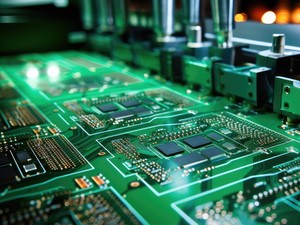Effective solder masks: the key to optimized soldering processes
The family-owned company Leutz Lötsysteme GmbH specializes in the development, design and production of soldering systems.
Based in Albershausen, Baden-Württemberg, the experts have been designing and manufacturing specific systems for almost 40 years to ensure a precise and error-free soldering process, even for complex PCBs. Solder masks play a particularly important role in wave and selective soldering.
The GFRP solder masks usually integrated into a soldering frame from Leutz soldering systems enable a variety of soldering processes and ensure ideal and reproducible soldering results. The soldering frame precisely positions and fixes both flexible and rigid PCBs, while the solder mask protects selected areas of a PCB from direct contact with the solder. SMD components, surrounding contact surfaces, gold contacts and technically complex PCB layouts with SMD components attached to the underside can be shielded.
Precision despite thin bridges
Due to the increasing use of SMD components, titanium solder masks have established a strong position in the electronics industry. With their outstanding properties and performance advantages, these solder masks offer effective protection during the soldering process, especially for SMD and THT components. For example, titanium allows the production of thin bridges of up to 0.3 mm, which also makes the material suitable to produce complex PCBs. In addition, specially manufactured titanium solder masks ensure efficient heat transfer, which significantly increases the soldering quality and therefore the overall reliability of electronic products.
Titanium masks allow PCBs to be preheated for the targeted protection of SMD components. The aim is to reduce the thermal load on the components and the mechanical stresses on a PCB by minimizing temperature differences. In addition, the solder flows smoothly and in a controlled manner during the soldering process, enabling optimum soldering results to be achieved even on densely populated PCBs with very small gaps between individual components and conductor paths.
At the same time, the precise covering of components by the titanium mask prevents direct contact with the solder. Since the solder masks of Leutz soldering systems are equipped with floating titanium covering plates, they adapt to the thermal expansion of a circuit board. Covered areas therefore remain protected throughout the entire soldering process. As sensitive components (in particular) are not wetted or deformed, the electronic components installed on the PCB are more stable and have a longer service life.
Titanium solder masks ensure consistent heat distribution in the PCB and effectively protect SMD components during the soldering process, thereby contributing to high soldering quality.
Innovations for a wide range of requirements
In addition to the titanium masks, which can be used for a very long time and are more durable than GRP masks, the experts at Leutz Lötsysteme have also developed other specific products. The aim is to make a significant contribution to increasing the soldering quality and overall reliability of electronic products. For instance, the soldering system experts' portfolio includes a universal soldering frame that can be flexibly adjusted in width and length. The universal soldering frame can be precisely aligned to customer-specific PCBs and is suitable to produce small series, prototypes and repairs. A hold-down device is available as an option for fixing components for the soldering process. A specifically developed loading and unloading station ensures quick and easy handling of flex PCBs.
Partnership for first-class PCB production
As a trusted partner for all aspects of PCB production, the experts at Leutz Lötsysteme support their customers in improving production quality. With in-house developed innovative equipment, production steps can be reproduced and the risk of damage or displacement of components is minimized. As a result, time-consuming rework such as manual covering or hand soldering can be eliminated, and the workload and error rate are significantly reduced. The precise handling of PCBs not only results in greater reliability, durability and performance of assemblies, but also reduces production costs and increases manufacturing quality.





